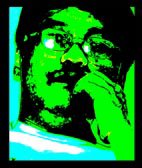
The most striking example of this mode of Foucault's thought is his first major work, The History of Madness in the Classical Age (1961). This book originated in Foucault's academic study of psychology (a licence de psychologie in 1949 and a diplome de psycho-pathologie in 1952) and his work in a Parisian mental hospital, but it was mainly written during his post-graduate Wanderjahren (1955-59) through a succession of diplomatic/educational posts in Sweden, Germany, and Poland. A study of the emergence of the modern concept of "mental illness" in Europe, The History of Madness is formed from both Foucault's extensive archival work and his intense anger at what he saw as the moral hypocrisy of modern psychiatry. Standard histories saw the nineteenth-century medical treatment of madness (developed from the reforms of Pinel in France and the Tuke brothers in England) as an enlightened liberation of the mad from the ignorance and brutality of preceding ages.
But, according to Foucault, the new idea that the mad were merely sick ("mentally" ill) and in need of medical treatment was not at all a clear improvement on earlier conceptions (e.g., the Renaissance idea that the mad were in contact with the mysterious forces of cosmic tragedy or the 17th-18th-century view of madness as a renouncing of reason). Moreover, he argued that the alleged scientific neutrality of modern medical treatments of insanity are in fact covers for controlling challenges to a conventional bourgeois morality. In short, Foucault argued that what was presented as an objective, incontrovertible scientific discovery (that madness is mental illness) was in fact the product of eminently questionable social and ethical commitments.
Foucault's next history, The Birth of the Clinic (1963) can similarly be read as a critique of modern clinical medicine. But the socio-ethical critique is muted (except for a few vehement passages), presumably because there is a substantial core of objective truth in medicine (as opposed to psychiatry) and so less basis for critique. As a result The Birth of the Clinic is much closer to a standard history of science, in the tradition of Canguilhem's history of concepts. The same is true of The Order of Things, which was controversial much more for its philosophical attacks on phenomenology (and Marxism) than for its complex and nuanced critique of the human sciences. But Foucault returns with full force to social critique in Discipline and Punish.
No comments:
Post a Comment